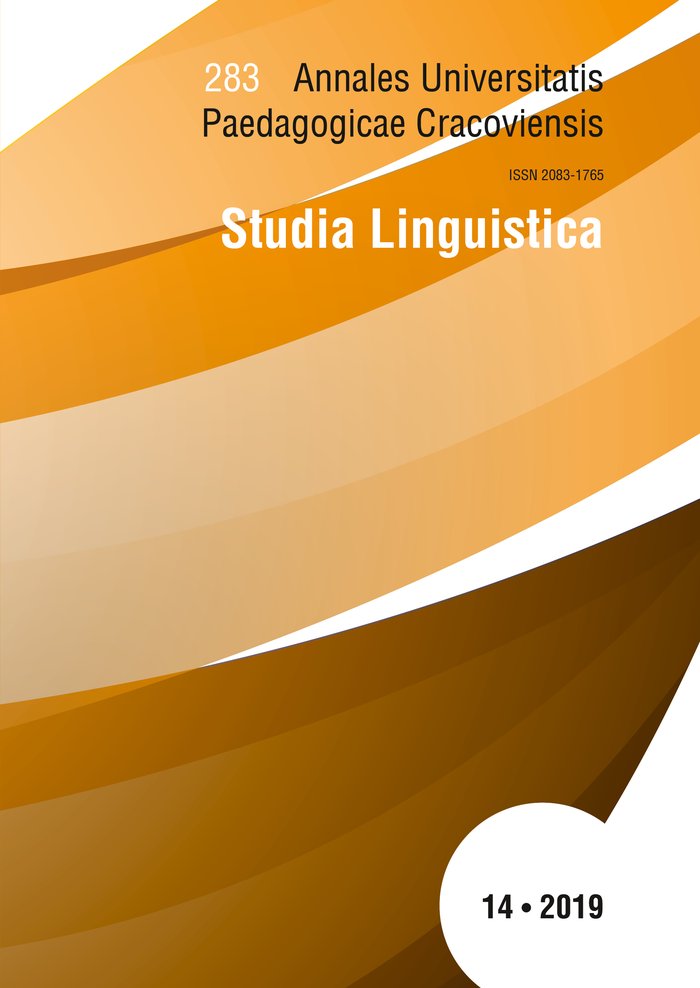Bołt, dorożka, trehubica – names of instruments used for fishing in Józef Weyssenhoff’s Puszcza
Main Article Content
Abstract
The subject of research in the following article are the names of fishing devices, presented by Józef Weyssenhoff in his novel entitled Puszcza (1913). From the rich resources of lexical and semantic regionalisms, the author chose three names: bołt, dorożka and trehubica, documented in the work and related to the topics of shooting and hunting - the subjects that the author was well acquainted with. On the basis of Weyssenhoff’s comments placed in the footnotes and remarks introduced to the main text of the novel, the meaning that the given words assume in the language of fishermen in Polesie was determined. The information obtained in this way was then compared with the content included in the dictionaries of the Polish language and dialect, as well as in important collections of borderline vocabulary: dictionary sources and mono-graphs of the Polish language used in the area of North Borderline.
Downloads
Article Details
Author, submitting a text to the editorial board of the journal “Annales Universitatis Paedagogicae Cracoviensis. Studia Linguistica", certifies that the content of the article has not been published so far and that the work does not violate in any way the copyright or related rights of other person, as well as other rights of third parties, and that no one's rights to the work (or any part thereof) have been missed. After signing the contract, the property rights to the published materials are transferred to the University of the National Education Commission, Krakow.
“Annales Universitatis Paedagogicae Cracoviensis. Studia Linguistica” is an open access journal, and all its content is made available free of charge to users and institutions under the Creative Commons CC-BY-NC-ND 4.0 license (attribution, non-commercial use, no derivative works). Under this license, the authors agree that their work may be lawfully reused for any purpose, except for commercial purposes, without the prior consent of the author or publisher. Everyone can read, download, copy, print, distribute and process these works, provided that the author's marking and the original publication place are correct. Published texts may not be used to create derivative works (e.g. to translate and publish in another language without the consent of the publisher). This is in line with the BOAI (Budapest Open Access Initiative) definition. "Studia Linguistica" does not charge for submitting or processing articles.
References
Danowska E., 2015, Józef Weyssenhoff (1860−1932) – pisarz, bibliofil, kolekcjoner. Nieznane oblicze twórcy, Kielce.
Google Scholar
Fischer A., 1926, Podręcznik etnografji Polski, Lwów−Warszawa−Kraków.
Google Scholar
Grek-Pabisowa I. i in., 2008, Język polski na Białorusi Radzieckiej w okresie międzywojennym. Polszczyzna mówiona, Warszawa.
Google Scholar
Janiak B., 1995, Polsko-ukraińskie związki językowe na przykładzie gwary Niemirowa nad Bugiem. Fonetyka, fonologia, słownictwo, Łódź.
Google Scholar
Karolczuk-Kędzierska M. (red.), 2004, Encyklopedia Kresów, Kraków.
Google Scholar
Kieniewicz A., 1989, Nad Prypecią dawno temu... Wspomnienia z zamierzchłej przeszłości, Wrocław−Warszawa−Kraków−Gdańsk−Łódź.
Google Scholar
Koniusz E., 2001, Polszczyzna z historycznej Litwy w Słowniku gwar polskich Jana Karłowicza, Kielce.
Google Scholar
Kurzowa Z., 1993, Język polski Wileńszczyzny i kresów północno-wschodnich XVI−XX w., Warszawa−Kraków.
Google Scholar
Ossowski L., 1932, Białoruszczyzna w Puszczy Józefa Weyssenhoffa, „Język Polski” XVII, s. 65−68.
Google Scholar
Piszczkowski M., 1934, Polesie J. Weyssenhoffa, „Ziemia. Ilustrowany Miesięcznik Krajoznawczy”, t. XIX, nr 6, s. 110−116.
Google Scholar
Rodziewicz G., 1895, Rybactwo na Litwie, „Wisła. Miesięcznik geograficzno-etnograficz-ny” IX, s. 92−99.
Google Scholar
Sawaniewska-Mochowa Z., 2002, Ze studiów nad socjolektem drobnej szlachty kowieńskiej XIX wieku, Bydgoszcz.
Google Scholar
Sobierajski Z. (red.), 1996, Atlas języka i kultury ludowej Wielkopolski, t. IX, Rybołówstwo, Poznań.
Google Scholar
Szypowska I., 1976, Weyssenhoff, Warszawa.
Google Scholar
Turska H.,1939/1982, O powstaniu polskich obszarów na Wileńszczyźnie, przedruk zachowanego z 1939 r. fragmentu rozprawy Studia nad polszczyzną kresową, t. I, s. 19−121.
Google Scholar
Weyssenhoff J., [1925], Mój pamiętnik literacki, Poznań−Warszawa−Wilno−Lublin.
Google Scholar
